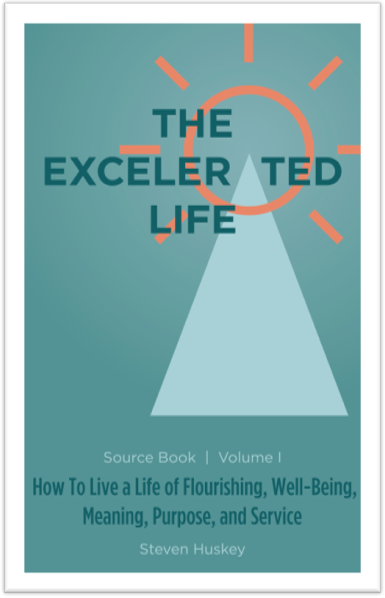Productivity isn’t simply completing a lot of tasks efficiently. It is creating a life that aligns with your purpose, values, and vision. It is being efficient and effective, i.e., doing the right things right.
Doing the Right Things, the Right Way
In our fast-paced modern life, productivity is often reduced to a race against the clock. How much can we accomplish in the shortest amount of time possible? But that mindset leads to burnout, distraction, and a feeling of never being “caught up.” Plus, we may get so immersed in checking items off our to-do list that we never get to the things that could make a real difference in our lives. Imagine the relief of not being constantly under the pressure of time constraints.
Excelerated Productivity™ is a practice that draws deeply from ancient wisdom, modern psychology, and proven coaching techniques. It’s a way to help us do what matters most with clarity, purpose, and consistency, and to produce meaningful results, not just more activity.
Excelerated Productivity™ serves as a solid Foundation for Focused Living, a way to help us do what matters most with clarity, purpose, and consistency.

A Foundation for Focused Living
“It is not that we have a short time to live, but that we waste a lot of it.” ~ Seneca
Long before productivity apps and time management systems, ancient philosophers taught principles that remain as relevant today as they were thousands of years ago. Here are five key insights that inform Excelerated Productivity™:
- Live in the Present.
Productivity begins with presence. The Stoics, Buddhists, and other ancient thinkers taught the importance of mindfulness and focusing your attention fully on the task at hand, rather than worrying about the past or future. - Prioritize What Matters.
Ancient teachings encourage simplicity and focus. Doing one thing well is more effective than doing ten things poorly. Eliminate distractions and make space for deep work. - Find Joy in Your Work.
Productivity is sustainable when it’s rooted in passion and purpose. Ancient wisdom calls us to align our work with our strengths and values, creating meaning that fuels motivation. Emphasizing the joy in your work can make you feel more engaged and passionate about your tasks. - Honor the Rhythm of Work and Rest.
Like the Sabbath tradition or the rule of life practiced in monastic communities, balance is vital. True productivity includes scheduled rest and reflection, not just constant output. This balance can make you feel more relaxed and less overwhelmed. - Connect Work to a Larger Purpose.
When we see our work as a means to serve others, grow spiritually, or contribute to a greater good, productivity becomes more than just a to-do list. It becomes a path for making our world a better place.
The Science of Productive Happiness
Modern research supports what the ancients knew: mindset matters. Here are some ways positive psychology enhances productivity:
- Positive Emotions = Better Performance.
Joy, gratitude, and optimism activate the brain’s executive function, which boosts creativity, decision-making, and resilience. - Flow State Enhances Focus.
When you’re fully immersed in meaningful work, time seems to disappear. Flow states are highly productive and deeply satisfying. - Play to Your Strengths.
Focusing on what you do well leads to higher engagement and better outcomes. It’s more effective than constantly trying to fix weaknesses. - Create a Positive Environment.
Encouragement, collaboration, and feedback create cultures of high performance and high well-being. - Happy People Are More Productive.
Research shows that satisfaction precedes success. When we feel good, we perform better. Period.
The Way of Excelerated Productivity™
These core coaching principles of Excelerated Productivity™ bring everything together:
- Work on the Right Things.
Don’t chase every opportunity. Choose the few things that matter, and say no to the rest. - Clarity Comes First.
When you’re clear on what matters, it’s easier to say “yes” with intention and “no” without guilt. - Small Steps Lead to Big Wins.
Start small. Build momentum. Progress happens through consistent action. - Energy > Time.
Use your best hours for your most important work. Don’t just fill your calendar, protect your focus. - Build Systems, Not Just Goals.
Routines and environment beat willpower. Structure your success. - Eliminate Distractions.
Focus is a skill. Guard it with intention: turn off notifications, close tabs, and simplify your schedule. - Review and Refine.
Remember, what gets measured gets managed. Regular reviews help you adjust your course and stay aligned with your goals.

Apply the Scientific Method to Your Productivity
Let’s look at how we might use the scientific method to improve productivity. This consists of four steps: 1) Make an observation that describes a problem. 2) Create a hypothesis. 3) Test the hypothesis. 4) Draw conclusions and refine the hypothesis.
Here’s how you might approach your productivity like a scientist:
- Make an observation: “I’m not making progress on what matters most.”
- Create a hypothesis: “If I do the hard thing first each day, I’ll make consistent progress.”
- Experiment: Try it for one week. Start each day with the task that moves the needle most.
- Draw a conclusion: Did it help? What shifted? How can you refine the approach moving forward?
This approach helps you stay curious, adaptive, and focused on results rather than rigid routines. How might you incorporate this idea to improve your productivity?
A Real-Life Example: “Do the Hard Thing First”
Sara found herself constantly “busy”, yet she never made any progress on her primary goals. Together, we identified one daily habit: Do the hard thing first. For her, that meant starting her day with deep work on her key project, before checking email or jumping into meetings.
Within three weeks, Sara’s momentum skyrocketed. She completed a major deliverable ahead of schedule and reported a huge boost in confidence, energy, and satisfaction.
Actions To Do This Week
- Action 1: Identify your top priority. Schedule one block of time tomorrow to work on it first.
- Action 2: Reflect on what fills your time and energy. Where can you realign with your values and goals?
- Action 3: Practice a weekly review. What worked? What didn’t? What will you do differently next week?
Do the Right Things Right
True productivity isn’t checking boxes on a to-do list. It is creating a life that aligns with your purpose, values, and vision. By combining ancient wisdom, positive psychology, and intentional coaching strategies, you can stop spinning your wheels and start moving forward with confidence and clarity. Productivity isn’t simply completing a lot of tasks efficiently. It is being efficient and effective, i.e., doing the right things right. That’s how you embrace your Excelerated Life™!
Choose one principle that resonated with you and apply it. Start small. Stay consistent. And remember: progress, not perfection, is the goal.
Share your experience by leaving a comment below.
Excelerated Productivity™ — improving efficiency and effectiveness — is one practice for creating your Excelerated Life™, a life of flourishing and well-being, and a life of meaning, purpose, and service.
Read more about the Excelerated Life™.
Resources:
Fredrickson, Ph.D., Barbara, L. Positivity. New York: Crown Publishing Group, 2009.
Grenville-Cleave, Bridget. Positive Psychology: A Practical Guide. New York: MJF Books. 2012.
Palmer, Max. “9 Timeless Productivity Tips from Ancient Philosophers.” Calendar|Productivity Center. Calendar, Inc., November 6, 2020. Web. July 25, 2025.
https://www.calendar.com/blog/9-timeless-productivity-tips-from-ancient-philosophers/
Seligman, Ph.D., Martin E. P. Flourish. New York: Free Press, 2011.
“The science of happiness at work: How positive psychology can increase productivity.” Penn LPS|Online. Penn LPS Online at the University of Pennsylvania, October 6, 2023. Web. July 25, 2025.
https://lpsonline.sas.upenn.edu/features/science-happiness-work-how-positive-psychology-can-increase-productivity#:~:text=Satisfied%20employees%20are%20more%20confident,efficiency%2C%20productivity%2C%20and%20profitability.
This blog post includes research information provided by ChatGPT, an AI language model developed by OpenAI. The content was generated with AI assistance and is intended to provide information and guidance. Please note that the suggestions are not official statements from OpenAI. To learn more about ChatGPT and its capabilities, you can visit the OpenAI website.


